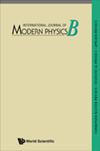Enhancing grid stability through predictive control and fuzzy neural networks in flywheel energy storage systems integration
IF 2.6
4区 物理与天体物理
Q2 PHYSICS, APPLIED
引用次数: 0
Abstract
Renewable energy systems, exemplified by solar and wind power, are increasingly integrated into modern power grids to mitigate environmental impact and reduce reliance on fossil fuels. However, the inherent intermittency and unpredictability of renewable energy sources pose challenges to grid stability and reliability. Energy Storage Systems (ESS) offer a promising solution to address these challenges by smoothing out power fluctuations and ensuring a consistent power supply. Among various ESS technologies, Flywheel Energy Storage Systems (FESS) have emerged as a noteworthy contender due to their rapid response times, low operating costs, and extended lifespan. This paper focuses on investigating the operation of a novel unit comprising a solar power system integrated with a Flywheel Energy Storage System (PV-FESS). The aim is to develop an effective control algorithm utilizing adaptive fuzzy neural networks and model predictive control (ANFIS-MPC) to manage power fluctuations stemming from renewable energy sources within the grid. The proposed control strategy aims to optimize the operation of the PV-FESS system by dynamically adjusting the energy absorption or release of the flywheel to maintain grid stability. Simulation studies conducted using Matlab-Simulink/Simcape software validate the efficacy of the ANFIS-MPC algorithm in mitigating abnormal fluctuations from renewable energy sources. The results demonstrate that the PV-FESS system effectively balances power fluctuations, ensuring a stable and reliable power output to the grid.通过飞轮储能系统集成中的预测控制和模糊神经网络增强电网稳定性
以太阳能和风能为代表的可再生能源系统正越来越多地融入现代电网,以减轻对环境的影响,减少对化石燃料的依赖。然而,可再生能源固有的间歇性和不可预测性给电网的稳定性和可靠性带来了挑战。储能系统(ESS)通过平滑电力波动和确保稳定的电力供应,为应对这些挑战提供了一个前景广阔的解决方案。在各种 ESS 技术中,飞轮储能系统(FESS)因其响应速度快、运行成本低、使用寿命长而成为值得关注的竞争者。本文重点研究由太阳能发电系统和飞轮储能系统(PV-FESS)组成的新型装置的运行情况。目的是利用自适应模糊神经网络和模型预测控制(ANFIS-MPC)开发一种有效的控制算法,以管理电网中可再生能源产生的电力波动。所提出的控制策略旨在通过动态调整飞轮的能量吸收或释放来优化 PV-FESS 系统的运行,从而保持电网的稳定性。使用 Matlab-Simulink/Simcape 软件进行的仿真研究验证了 ANFIS-MPC 算法在缓解可再生能源异常波动方面的功效。结果表明,PV-FESS 系统能有效平衡电力波动,确保向电网输出稳定可靠的电力。
本文章由计算机程序翻译,如有差异,请以英文原文为准。
求助全文
约1分钟内获得全文
求助全文
来源期刊

International Journal of Modern Physics B
物理-物理:凝聚态物理
CiteScore
3.70
自引率
11.80%
发文量
417
审稿时长
3.1 months
期刊介绍:
Launched in 1987, the International Journal of Modern Physics B covers the most important aspects and the latest developments in Condensed Matter Physics, Statistical Physics, as well as Atomic, Molecular and Optical Physics. A strong emphasis is placed on topics of current interest, such as cold atoms and molecules, new topological materials and phases, and novel low dimensional materials. One unique feature of this journal is its review section which contains articles with permanent research value besides the state-of-the-art research work in the relevant subject areas.
 求助内容:
求助内容: 应助结果提醒方式:
应助结果提醒方式:


